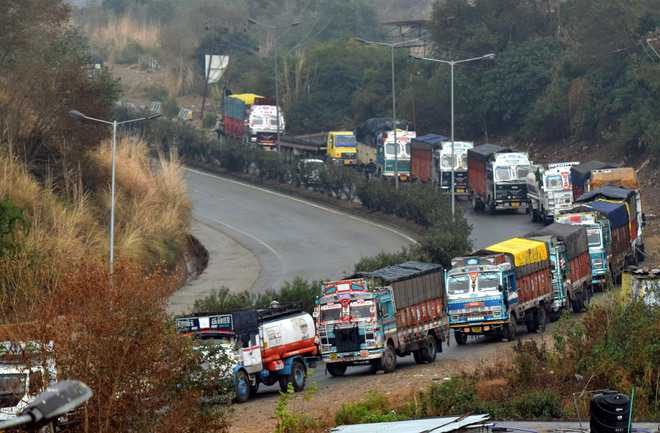- Road, air connectivity to Kashmir snapped; 1,000 vehicles stranded on Srinagar highway
- Winter’s first rainfall in Jammu brings hope for wheat farmers
 The winter season’s first rainfall in Jammu today brought normal life to a grinding halt across the state, with heavy snowfall and landslides triggered by continuous rain on the Jammu-Srinagar national highway snapping the Kashmir valley’s road connectivity with the rest of the world.
The winter season’s first rainfall in Jammu today brought normal life to a grinding halt across the state, with heavy snowfall and landslides triggered by continuous rain on the Jammu-Srinagar national highway snapping the Kashmir valley’s road connectivity with the rest of the world.
According to official sources, around 1,000 trucks and passenger vehicles were stranded at different places on the national highway, while the traffic police have advised the passenger vehicles to return to Jammu in view of inclement weather forecast for tomorrow.
Besides, all Srinagar-based flights from the Jammu Airport were cancelled due to inclement weather conditions and heavy snowfall in Srinagar.
“The highway was blocked at Patnitop and on both ends of the Jawahar Tunnel (JT) following the slippery conditions caused by heavy snowfall. More than 700 trucks and 250 passenger vehicles were stranded in Shahnawas, Banihal, Ramsu, Digdol, Peerah, Udhampur and other areas on the highway,” the sources said.
The sources said landslides and falling stones also blocked the highway at Marog and Mehar. “Though the administration has pressed its men and machinery into service, yet the continuous rain and heavy rainfall hampered the road clearance work. There are bleak chances that the highway will be reopened for traffic tomorrow,” the sources said.
The vehicular traffic was stopped around the Jawahar Tunnel at 12.30 pm and at Patnitop at 2.45 pm due to the slippery conditions.
On the directions of the Deputy Commissioner, Ramban, Mohammed Aijaz, all the Disaster Management Committees in the district have been alerted and the members manning the various shelter sheds at Banihal, Ramsu, Ramban and Batote have been assigned their duties to remain ready to reach out to the stranded passengers. The power supply to the areas experiencing snowfall in Ramban district was disrupted, while the telecommunication services, especially of BSNL, troubled the mobile phone users.
According to Indian Meteorological Department (IMD) officials, Jammu experienced 23.8 mm rainfall, while the Banihal recorded 47.8 mm rainfall on Friday. “There was an accumulation of 7-8 cm snow in Banihal,” the officials said, adding that the upper reaches of Rajouri, Poonch and Kathua districts also experienced snowfall.
The snowfall on upper reaches and incessant rain have brought chill in the air as the day’s temperature plummeted by six degrees below normal in Jammu. “The day temperature was 12.3°C in Jammu, which was six degrees below normal. Widespread rains are predicted to lash the region,” the IMD said.
Rajesh Bali, Superintendent of Police (SP), Jammu Airport, said all Srinagar-bound flights were cancelled due to inclement weather conditions, while all other flights operated normally.
The power supply in many parts of the Jammu region remained affected due to technical snag in two major grid stations. However, senior officials remained tight-lipped over the situation and evaded direct queries on non-availability of power supply.
After a long dry spell in the Jammu region, the first rain of the season today brought some hope for the farmers.
The wheat seeds, which should have been planted by November-end, are yet to be sowed in the Jammu region as the land has been dry in the absence of rain.
Only 25 per cent of the wheat seeds have been sown so far in irrigated land. Farmers had been awaiting rain to sow the late variety of wheat seeds.
The wheat crop is grown on 2.4 lakh hectares in the Jammu region. Of this, only 25 per cent of land is irrigated while the 75 per cent is fully dependent on rainwater for irrigation.
“We use to sow the seeds by November- nd but due to less moisture in the soil, the best time for sowing the seeds has already lapsed. However, we can now sow the late variety of wheat seeds as today’s rain brought moisture to the soil,” said Sohal Lal, a farmer from Kalakot.
Director, Agriculture, Jammu, Ashok Magotra said: “All eyes were towards the clouds for the last more than a month and finally, we have got a spell of good rain in Jammu. Now, the farmers will be able to sow the late variety of wheat.”
The Jammu region which requires 11.50 lakh metric tonnes of food grains is considered self-sufficient.
The Agriculture Department, however, fears that the wheat crop will be severely deficit this year.




